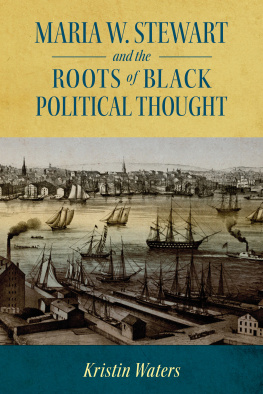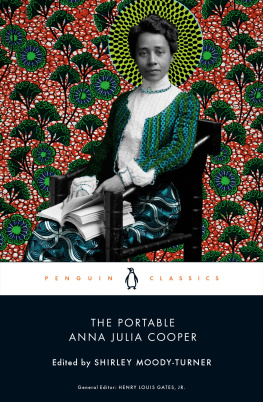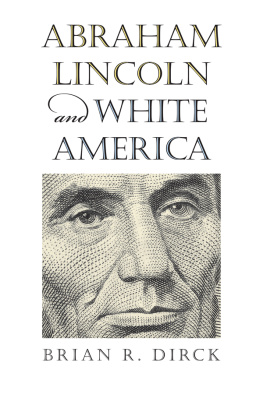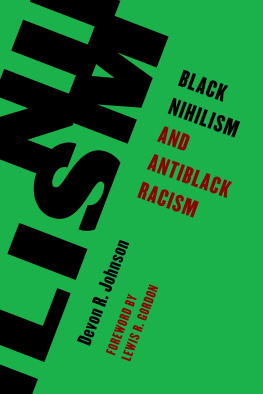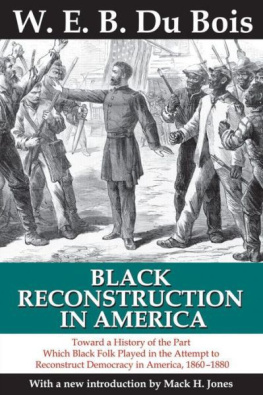Margaret Walker Alexander Series in African American Studies
www.upress.state.ms.us
Designed by Peter D. Halverson
The University Press of Mississippi is a member of the Association of American University Presses.
Copyright 2017 by University Press of Mississippi
All rights reserved
Manufactured in the United States of America
First printing 2017
Library of Congress Cataloging-in-Publication Data
Names: Behnken, Brian D., editor. | Smithers, Gregory D., 1974 editor. | Wendt, Simon., editor.
Title: Black intellectual thought in modern America : a historical perspective / edited by Brian D. Behnken, Gregory D. Smithers, and Simon Wendt.
Description: Jackson : University Press of Mississippi, 2017. | Series: Margaret Walker Alexander series in African American studies | Includes bibliographical references and index. |
Identifiers: LCCN 2017012606 (print) | LCCN 2017016658 (ebook) | ISBN 9781496813664 (epub single) | ISBN 9781496813671 (epub institutional) | ISBN 9781496813688 ( pdf single) | ISBN 9781496813695 (pdf institutional) | ISBN 9781496813657 (cloth : alk. paper)
Subjects: LCSH: African AmericansIntellectual life. | African American intellectualsHistory. | African American philosophyHistory. | African AmericansCivil rightsHistory. | African AmericansSocial conditions.
Classification: LCC E185.89 .I56 (ebook) | LCC E185.89 .I56 B55 2017 (print) | DDC 323.1196/073dc23
LC record available at https://lccn.loc.gov/2017012606
British Library Cataloging-in-Publication Data available
INTRODUCTION
BRIAN D. BEHNKEN, GREGORY D. SMITHERS, SIMON WENDT
In 2013, the African American philosopher Lewis R. Gordon wrote, Black intellectuals face a neurotic situation. Like African American writers before him who paused to consider the place of black intellectuals in American society, Gordon understood that black intellectuals face a dilemma: on the one hand, they are routinely questioned about whether there are black thinkers on a par [with](or beyond) those of the Western canon ranging from Plato and Aristotle to Hegel and Marx and on to recent times such as Sartre and Foucault. On the other hand, those African Americans who do devote themselves to a life of the mind open themselves to criticism for being too bookish and for failing to be in the streets, where the struggle is being waged.1 In our current era of urban unrest, the media exposure of police violence in predominantly black communities, and the rise of the Black Lives Matter movement, this latter concern seems particularly prescient.2
Due to the current state of social and political life in the United States, the need for black intellectuals and African American ideas remains as pressing as ever. But what types of ideas are needed? Indeed, what type of education should black Americans seek out? Should education and knowledge be purely utilitarian in their function, or can one seek out all of the science, art, and learning in the world for the sake of learning? As Gordon reminds us, these are not new questions, but they are enduring ones. Gordon spoke to these questions by reflecting on the apparent need for black intellectuals to justify their existencewhether in terms of comparing the quality of black thought to that of Western (read: white) thinking, or in relation to the gritty reality of the inner city. Moreover, since World War II the urban environment has acted as a synonym for street cred, keepin it real, and what in popular culture is considered an authentic African American experience, which again underscores how racial perceptions remain operational in American life just as black intellectuals work to foster historical understanding, deconstruct racialized thinking, and devise sociological and political strategies for meeting the myriad needs of black communities.3
The challenges associated with being an articulate, well-educated black man or woman in the United States are fairly well known. Black intellectualism adds an additional obstacle to the lived experience of many African Americans. From abolitionists, such as Frederick Douglass, to Barack Obama, whose navigation of the overwhelmingly white world of American politics to rise to become the president of the United States, questions about intellect and racial authenticity and legitimacy have often followed prominent black intellectuals and political leaders as they pursue knowledge and work to apply their knowledge in communities throughout the United States. Indeed, white Americans are often unable to resist the urge to mix what they understand as compliments with a thinly veiled racialism when asked to characterize prominent African American intellects and leaders.
Take for example the characterizations that have dogged President Obama during his time in the White House. Obama, like black leaders who came before him, has been portrayed as a figure of the United States salvation on the one hand, and an agent for the republics decline on the other. While interviewing a group of eighteen-to-twenty-four-year olds about the contradictory perceptions white people have of Obama, African American scholars H. Samy Alim and Geneva Smitherman identified one white Americans description of the president as emblematic of the terms used to describe him. Responding to Alim and Smithermans questionnaire, the respondent wrote that Obama was [d]ignified yet humble, assertive yet calm/collected, stern yet compassionate, and formal while authentic, President Obamas language transcends the typical blandness of modern politicians (at least the old, white, male variety) and I believe he is truly able to inspire hope and confidence through his speeches.4 Obama, it would seem, can only be certain things if he is positioned against white, male politicians.
Few academics would label Obama as purely an intellectual. While he has a law degree from Harvard University and worked for a time as a faculty member at the University of Chicagos School of Law, he is first and foremost a politician. Yet his various publications and his education certainly qualify him as an intellectual. Nonetheless, the above quotation highlights the often-contradictory ways in which some Americans perceive black Americans of cultivated intellect and who rise to become spokespeople for the race and, in the case of President Obama, for the nation.5
Such questions and concerns do not seem to plague other segments of black intellectual and political leaders. In particular, black conservatives do not seem to have to validate their own positions in the way that a liberal leader such as President Obama does. For instance, Dr. Ben Carson had excelled throughout late 2015 as a conservative leader and as a possible front-runner for the Republican primary race. Carsons conservative viewpoints caused no great concern for his Republican constituents. Moreover, he has avoided, in some instances deliberately, topics that either deal with race or that concern African Americans. It could be argued that Carson is a cipher for white Americans; a black man who appeals to white conservative voters by seemingly operating within a white (i.e., not racialized) framework. Such a position means that his primarily white supporters can avoid many of the assumptions and opinions that dog a liberal such as Obama.


 A HISTORICAL PERSPECTIVE
A HISTORICAL PERSPECTIVE 

